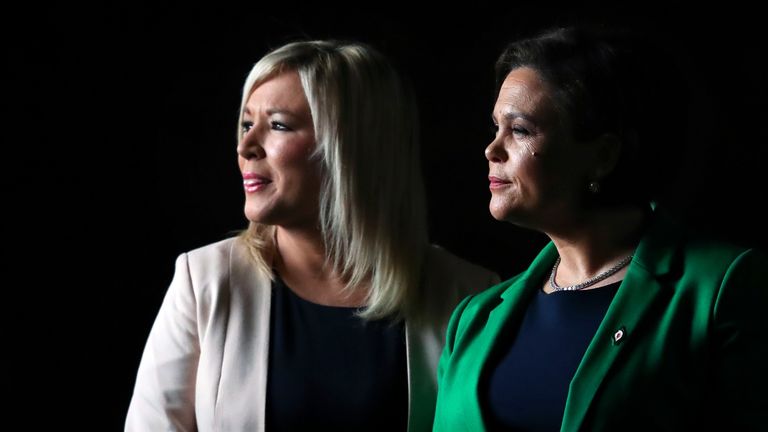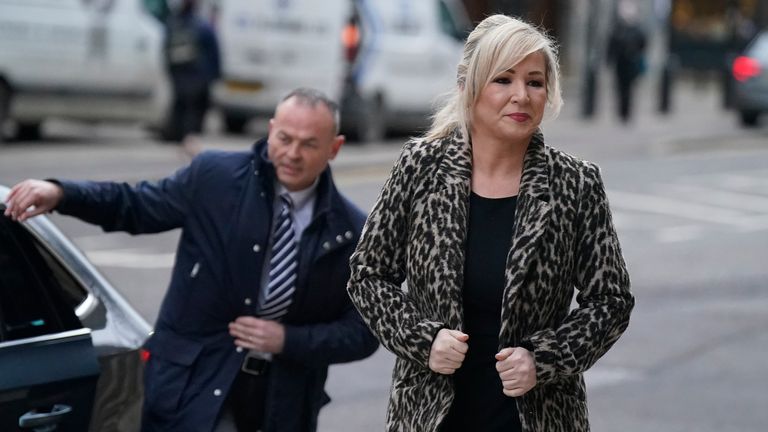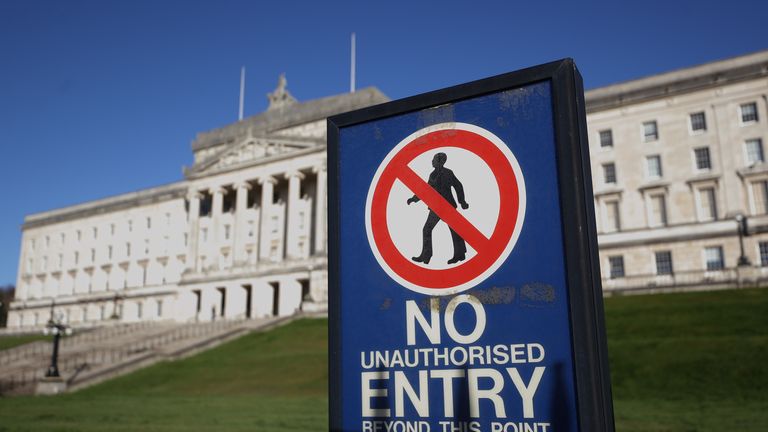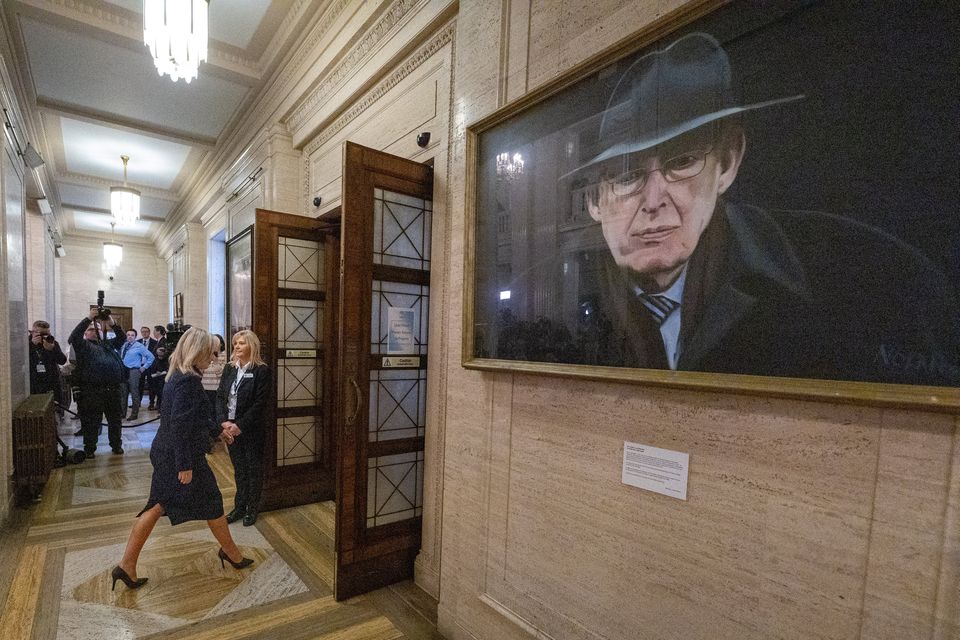Smoke and Mirrors – The Unionist Miracle – What’s really happening in the North of Ireland?
SATURDAY 3 FEBRUARY 2024,
BY JOSEPH HEALY
INTERNATIONAL VIEWPOINT
For two long years the North of Ireland has been in a state of political paralysis following the elections for the Assembly in 2022 when, for the first time in its history, the “Protestant state for a Protestant People”, produced an election victory for Sinn Fein and Irish nationalism. The hissy fit thrown by the DUP in refusing to return to the Assembly and taking second place as the smaller party with Michelle O’Neill as First Minister was seen as essential by DUP leaders and activists in order to appease the base. However, it would need to be based on some serious political grounds and not just betray the naked sectarian panic in losing control of the political apparatus for the first time in a century. That excuse was the Northern Ireland Protocol.
The DUP, known locally in the North of Ireland as the Dumb Unionist Party, had made strategic error after error. Firstly, in being an enthusiastic supporter of Brexit, when most in the North of Ireland were opposed to it, especially the young. Secondly, in swallowing Johnson’s promise of “no border in the Irish Sea”, which he enthusiastically sold to them as part of his over ready Brexit, which all can now see never defrosted in the middle. Johnson’s deal resulted in the Northern Ireland Protocol, which in order to protect the region’s unique status as having access to both the EU and UK markets, meant that goods coming from Britain needed to be checked to ensure that they were not destined for the Irish Republic and the EU across the guaranteed open border between the two parts of Ireland.
Jeffrey Donaldson, decided to take a stand on this declaring that it was effectively treating the North of Ireland in a different way from the rest of the UK state. No Border in the Irish Sea festooned lampposts in the hard line Unionist areas of Belfast and the old Unionist cry of No Surrender echoed across the Loyalist areas of the North of Ireland.
The Windsor Protocol, negotiated last year between the UK and the EU took the wind out of the DUP’s sails as it demonstrated that the UK government was more interested in a harmonious relationship with the EU than the concerns of the DUP. The British government told the DUP that there would be no further change and that some aspects of the Protocol had been softened with the assent of the EU. This clear sidelining of the DUP further enraged the base but they began to lose more and more support across the region as public services crumbled.
The recent huge public services strike, where DUP negotiators going to meet the NI Secretary of State, were heckled by strikers and told to go back to work, was very bad optics for the party. The result of the two year stalemate has been a lack of funding from Westminster, resulting in a situation in the NHS where it is in far worse state than other regions of the UK state and where public sector salaries lie far behind those of England, Wales and Scotland, resulting in a huge haemorrhaging of NHS staff across the border to the Irish Republic where they are paid far higher wages. For the public in the North of Ireland this has become the dominant political issue and much of their anger is directed at the DUP.
The political fact remained that the DUP, if it returned to the Assembly under Sinn Fein, would have to demonstrate some concrete victory after a two year boycott. This resulted in the current so called deal which is effectively no real change in the Windsor Agreement and was only backed by 53% of the DUP Executive, leaving Donaldson in a very exposed position and there is still talk of a possible split in the party.
Despite Donaldson’s claims, the protocol remains, as streamlined by the Windsor Framework. The Irish Sea border remains. Donaldson is highlighting the issue of checks on goods but there was never a problem with trade between the North of Ireland and GB, because the EU doesn’t care what goes into GB. The EU does care what goes into the single market and that is why the red lane exists under the Windsor Agreement.
As a recent article in The Irish News by Brian Feeney stated: “Speed is of the essence to get the deal over the line before there’s time for the DUP dissidents to see through the smoke and mirrors. Once done, no-one will notice any difference in everyday life. Except for one aspect, and it’s a fairly consequential one: There’ll be a Sinn Fein first minister in the person of Michelle O’Neill.”
The whole thing has been a piece of political theatre to assuage the fears of the Unionist base but essentially it is like Canute trying to hold back the tide as the Unionist tide in the North of Ireland retreats. The Loyalist hard men have threatened to block the roads of the region this Friday but they are a much reduced force compared to their heyday in the 70s when the Loyalist Workers force managed to paralyse the North of Ireland and bring down the Sunningdale Power Sharing Agreement.
For the DUP’s base hearing Mary Lou Mac Donald, President of Sinn Fein, tell the UK media that “Irish unity is within touching distance” is the real gall. With a Sinn Fein woman as First Minister in the North and a potential Sinn Fein government soon in the South, led by another Irish nationalist woman, Donaldson’s band aid on trade is a poor substitute for the loss of power which has over the last decade been the undoing of Unionism as the clock ticks down on the end of the partitionist dream.
1 February 2024
Source: Anti*Capitalist Resistance.
ATTACHED DOCUMENTSsmoke-and-mirrors-the-unionist-miracle-what-s-really_a8402.pdf (PDF - 908.5 KIB)
Extraction PDF [->article8402]
INTERNATIONAL VIEWPOINT
For two long years the North of Ireland has been in a state of political paralysis following the elections for the Assembly in 2022 when, for the first time in its history, the “Protestant state for a Protestant People”, produced an election victory for Sinn Fein and Irish nationalism. The hissy fit thrown by the DUP in refusing to return to the Assembly and taking second place as the smaller party with Michelle O’Neill as First Minister was seen as essential by DUP leaders and activists in order to appease the base. However, it would need to be based on some serious political grounds and not just betray the naked sectarian panic in losing control of the political apparatus for the first time in a century. That excuse was the Northern Ireland Protocol.
The DUP, known locally in the North of Ireland as the Dumb Unionist Party, had made strategic error after error. Firstly, in being an enthusiastic supporter of Brexit, when most in the North of Ireland were opposed to it, especially the young. Secondly, in swallowing Johnson’s promise of “no border in the Irish Sea”, which he enthusiastically sold to them as part of his over ready Brexit, which all can now see never defrosted in the middle. Johnson’s deal resulted in the Northern Ireland Protocol, which in order to protect the region’s unique status as having access to both the EU and UK markets, meant that goods coming from Britain needed to be checked to ensure that they were not destined for the Irish Republic and the EU across the guaranteed open border between the two parts of Ireland.
Jeffrey Donaldson, decided to take a stand on this declaring that it was effectively treating the North of Ireland in a different way from the rest of the UK state. No Border in the Irish Sea festooned lampposts in the hard line Unionist areas of Belfast and the old Unionist cry of No Surrender echoed across the Loyalist areas of the North of Ireland.
The Windsor Protocol, negotiated last year between the UK and the EU took the wind out of the DUP’s sails as it demonstrated that the UK government was more interested in a harmonious relationship with the EU than the concerns of the DUP. The British government told the DUP that there would be no further change and that some aspects of the Protocol had been softened with the assent of the EU. This clear sidelining of the DUP further enraged the base but they began to lose more and more support across the region as public services crumbled.
The recent huge public services strike, where DUP negotiators going to meet the NI Secretary of State, were heckled by strikers and told to go back to work, was very bad optics for the party. The result of the two year stalemate has been a lack of funding from Westminster, resulting in a situation in the NHS where it is in far worse state than other regions of the UK state and where public sector salaries lie far behind those of England, Wales and Scotland, resulting in a huge haemorrhaging of NHS staff across the border to the Irish Republic where they are paid far higher wages. For the public in the North of Ireland this has become the dominant political issue and much of their anger is directed at the DUP.
The political fact remained that the DUP, if it returned to the Assembly under Sinn Fein, would have to demonstrate some concrete victory after a two year boycott. This resulted in the current so called deal which is effectively no real change in the Windsor Agreement and was only backed by 53% of the DUP Executive, leaving Donaldson in a very exposed position and there is still talk of a possible split in the party.
Despite Donaldson’s claims, the protocol remains, as streamlined by the Windsor Framework. The Irish Sea border remains. Donaldson is highlighting the issue of checks on goods but there was never a problem with trade between the North of Ireland and GB, because the EU doesn’t care what goes into GB. The EU does care what goes into the single market and that is why the red lane exists under the Windsor Agreement.
As a recent article in The Irish News by Brian Feeney stated: “Speed is of the essence to get the deal over the line before there’s time for the DUP dissidents to see through the smoke and mirrors. Once done, no-one will notice any difference in everyday life. Except for one aspect, and it’s a fairly consequential one: There’ll be a Sinn Fein first minister in the person of Michelle O’Neill.”
The whole thing has been a piece of political theatre to assuage the fears of the Unionist base but essentially it is like Canute trying to hold back the tide as the Unionist tide in the North of Ireland retreats. The Loyalist hard men have threatened to block the roads of the region this Friday but they are a much reduced force compared to their heyday in the 70s when the Loyalist Workers force managed to paralyse the North of Ireland and bring down the Sunningdale Power Sharing Agreement.
For the DUP’s base hearing Mary Lou Mac Donald, President of Sinn Fein, tell the UK media that “Irish unity is within touching distance” is the real gall. With a Sinn Fein woman as First Minister in the North and a potential Sinn Fein government soon in the South, led by another Irish nationalist woman, Donaldson’s band aid on trade is a poor substitute for the loss of power which has over the last decade been the undoing of Unionism as the clock ticks down on the end of the partitionist dream.
1 February 2024
Source: Anti*Capitalist Resistance.
ATTACHED DOCUMENTSsmoke-and-mirrors-the-unionist-miracle-what-s-really_a8402.pdf (PDF - 908.5 KIB)
Extraction PDF [->article8402]
Analysis
Those who campaigned to 'take back control' did not appreciate Brexit might give more power to those seeking Irish unity
The new first minister represents a party that does not acknowledge Northern Ireland's six counties as separate from the 26 counties in the Republic of Ireland. The historic moment has huge implications, David Blevins writes.
David Blevins
SKY NEWS
Senior Ireland correspondent
Adam Boulton: With Michelle O'Neill becoming Northern Ireland's first nationalist leader, is a united Ireland within 'touching distance'?

Northern Ireland's new first minister Michelle O'Neill 'contests' claim Irish unity is 'decades' away
The party refuses to take its seats at Westminster but regards power sharing at Stormont as a halfway house on the road to a united Ireland.
The Democratic Unionist Party (DUP), with whom it shares power, views it differently - quick to point out Sinn Fein is "administering British rule" at Stormont.
Nevertheless, the party long described as "the political wing of the IRA" has certainly come a long way since its 'Smash Stormont' election campaign in 1982.
Read more:
Why Northern Ireland's new first minister is hugely symbolic
Angry exchanges at Stormont
It was Ms O'Neill's predecessor, the former IRA commander Martin McGuinness, who made the transition from guns to government when he became deputy first minister.
But her elevation will boost the party's hopes of making history in the Republic by having its leader, Mary Lou McDonald, elected taoiseach (prime minister).

Those who campaigned to 'take back control' did not appreciate Brexit might give more power to those seeking Irish unity
The new first minister represents a party that does not acknowledge Northern Ireland's six counties as separate from the 26 counties in the Republic of Ireland. The historic moment has huge implications, David Blevins writes.
David Blevins
SKY NEWS
Senior Ireland correspondent
@skydavidblevins
Saturday 3 February 2024 1

Saturday 3 February 2024 1

Image:Michelle O'Neill. Pic: PA
It was dubbed "a Protestant parliament for a Protestant people" but 90 years later, there is a Catholic in the office of the first minister.
When Sinn Fein's Michelle O'Neill accepted the nomination, in the Irish language, a nationalist held the highest title in devolved government for the first time.
The sense of history was palpable at Stormont as members of the Northern Ireland Assembly filed back into the chamber after two years of stalemate.
She won't have more authority than she had as deputy first minister - the two most senior posts are codependent under power sharing - but it's hugely symbolic.
Parliament Buildings in the Stormont Estate represent decades of Unionist dominance. There are six floors inside and six pillars outside representing Northern Ireland's six counties.
But the new first minister represents a party that does not acknowledge those six counties as separate from the 26 counties in the Republic of Ireland.

It was dubbed "a Protestant parliament for a Protestant people" but 90 years later, there is a Catholic in the office of the first minister.
When Sinn Fein's Michelle O'Neill accepted the nomination, in the Irish language, a nationalist held the highest title in devolved government for the first time.
The sense of history was palpable at Stormont as members of the Northern Ireland Assembly filed back into the chamber after two years of stalemate.
She won't have more authority than she had as deputy first minister - the two most senior posts are codependent under power sharing - but it's hugely symbolic.
Parliament Buildings in the Stormont Estate represent decades of Unionist dominance. There are six floors inside and six pillars outside representing Northern Ireland's six counties.
But the new first minister represents a party that does not acknowledge those six counties as separate from the 26 counties in the Republic of Ireland.

Image:Parliament Buildings on the Stormont Estate. Pic: PA
The Irish words 'Sinn Fein' are literally translated as 'ourselves' or 'we ourselves', expressing a desire for the whole island to be separate from the UK.
MORE ON NORTHERN IRELAND
The Irish words 'Sinn Fein' are literally translated as 'ourselves' or 'we ourselves', expressing a desire for the whole island to be separate from the UK.
MORE ON NORTHERN IRELAND

Adam Boulton: With Michelle O'Neill becoming Northern Ireland's first nationalist leader, is a united Ireland within 'touching distance'?

Northern Ireland's new first minister Michelle O'Neill 'contests' claim Irish unity is 'decades' away
The party refuses to take its seats at Westminster but regards power sharing at Stormont as a halfway house on the road to a united Ireland.
The Democratic Unionist Party (DUP), with whom it shares power, views it differently - quick to point out Sinn Fein is "administering British rule" at Stormont.
Nevertheless, the party long described as "the political wing of the IRA" has certainly come a long way since its 'Smash Stormont' election campaign in 1982.
Read more:
Why Northern Ireland's new first minister is hugely symbolic
Angry exchanges at Stormont
It was Ms O'Neill's predecessor, the former IRA commander Martin McGuinness, who made the transition from guns to government when he became deputy first minister.
But her elevation will boost the party's hopes of making history in the Republic by having its leader, Mary Lou McDonald, elected taoiseach (prime minister).

Michelle O'Neill (L) and Mary Lou McDonald (R). Pic: PA
The sense of occasion on the hill overlooking Belfast did not prevent angry exchanges, not between power-sharing partners, but between the DUP and hardline Unionists.
The Traditional Unionist Voice party rejects Sir Jeffrey Donaldson's claim his deal with the UK government removes the Brexit border in the Irish Sea.
But those who campaigned to "take back control" did not appreciate that Brexit might give more control to those seeking to get Irish unity done.
The sense of occasion on the hill overlooking Belfast did not prevent angry exchanges, not between power-sharing partners, but between the DUP and hardline Unionists.
The Traditional Unionist Voice party rejects Sir Jeffrey Donaldson's claim his deal with the UK government removes the Brexit border in the Irish Sea.
But those who campaigned to "take back control" did not appreciate that Brexit might give more control to those seeking to get Irish unity done.

No comments:
Post a Comment